- Home
- Lauren Willig
The Other Daughter Page 16
The Other Daughter Read online
Page 16
And he had lifted her in his arms and held her close, just that one last time, his nose buried in her neck, blowing to make her giggle before setting her down again, smiling at her mother over her head.
As though everything were all right, as though everything would go on being just the way it was.
“You never told us you were coming to town,” Cece was saying.
You never told us you were leaving forever.
Rachel felt like a leaf in a strong wind, shivering and trembling. Inside. In the hidden bit that was Rachel Woodley.
In the mirror, she could see Miss Vera Merton, her bobbed hair perfectly arranged, her crimson-lipped face as smooth as the priceless porcelain pieces on the mantel. There was something chilling about that image. Like looking into a lie.
It brought her forcibly back to the present. She wasn’t a child anymore, braids flying, ready to run into her father’s arms. She was here under false pretenses, to confront the father who had left her all those years ago.
“—just for a few days,” her father was saying, and something about a debate in the Lords.
Rachel’s fingers prickled with fear and anticipation. How to make her presence known, what to say? Did she blurt it right out? Or edge around it?
For now, it was enough to stand in the shadows, to catch her breath. She had thought, after seeing all the clippings, after speaking to Simon, that she was prepared for this, prepared to see her father. She would be, she had decided, contained and cool. She would hold out a gloved hand and say coolly, “Hello, Father. Remember me?”
But nothing had prepared her for this, for the aching familiarity that crashed and washed over her, turned her into a child again, with a child’s love and a child’s hurt, as if it had been only days since he had gone and everything might be made right by his flinging her up into the air and catching her close again.
“Heavens, I nearly forgot! Vera, darling, do forgive?” Cece wafted a hand in her direction, all fluid charm. “Uncle Edward, may I present my friend Miss Vera Merton?”
As in a dream, Rachel moved forward, her legs surprisingly steady, her feet, in their elegant heeled shoes, soundless on the timeworn Axminster rug.
Her father turned in her direction, held out a hand. “How do you do, Miss Merton.”
“Lord Ardmore.” Rachel’s voice sounded strange to her ears, husky and foreign.
She lifted her eyes to his, the same eyes as his, Standish eyes, Simon had called them. Light-lashed on her father and Olivia, dark-lashed on her, but Standish eyes all the same. Her breath was tight in her chest as she waited, waited for some sign, some small flicker of recognition, of confusion.
But her father was already looking away, looking past her, to Cece, who was saying, “We’d thought to find Livvy. She isn’t tucked away behind a curtain, is she?”
Her father half smiled, such an achingly familiar half smile. “I am afraid Olivia is out—as you would have known, had you allowed Hutton time to tell you.”
Rachel felt like a ship becalmed in the middle of an uncharted sea. That was all? Not a second glance? Not a moment’s hesitation?
From very far away, she could hear the discordant chime of Cece’s laughter. “We won’t stop, then. We had an idea of surprising her, hadn’t we, Vera?”
“Oh, yes,” said Rachel vaguely. Vera. She was Vera here. Not Rachel. Did a little paint on her lips make such a difference? Would he have known her if he had seen her on the streets of Netherwell, before—before her transformation into something plucked and tweaked and polished?
Her father was gathering up his papers, closely written in a clear, if somewhat cramped hand. “Hutton, I am sure, will be delighted to give you tea, should you choose to wait for her.”
Cece made a face at Rachel, eloquent of horror. “I would never dream of putting Hutton out.”
“An extra pot of tea is the least of Hutton’s woes,” said Rachel’s father.
Cece’s eyes lit up. “It’s less than two months until Jicksy’s twenty-first, isn’t it? Mummy said—” She broke off, casting her uncle a look of arch penitence.
“Best you don’t tell me, I imagine,” he said drily, before adding, “I’ll ring up your mother tomorrow.”
Cece sparkled with mischief. “Then she can tell you herself. You needn’t see us out. We’ll horrify Hutton and make our own way to the hall.”
This was it. Her opportunity. To turn and say—something. Anything.
Do you remember me?
Don’t you know who I am?
Papa.
But her father was already settling himself in the winged chair, his spectacles again on his nose, his papers on his lap, and Cece was linking her arm through Rachel’s, and Rachel’s tongue was stuck fast, glued to the roof of her mouth.
“—the most tremendous fuss about Jicksy’s twenty-first,” Cece was saying. “Did you hear that they’ve shipped him off to Caffers to rusticate until the great event? Mummy says—”
Rachel hardly heard her. They were in the gallery now, steps away from the large portrait of the Countess of Ardmore and the flight of stairs that would lead them down to the hall, and out again into the world, her father receding with every step, away, away.
Rachel snatched her arm away from Cece’s. “I-I lost a ring. In the library. I won’t be a moment.”
Without leaving time for Cece to protest, Rachel dashed back, her skirt swishing briskly around her legs, her heels drumming a warning against the polished floor of the landing.
She pushed back through the door, too hard. It banged against the lintel, making an unholy noise.
Her father glanced up, looking at her with an expression of polite inquiry which froze the tumult of words on her lips. “Miss … Merton?”
Nothing. Nothing and again nothing.
On either side of the mirror on the mantel, paired portraits looked down. She had been so focused on her father before that she hadn’t noticed them. But she saw them now. One was Lady Olivia, painted into prettiness, wearing the feathers of court presentation. On the other was a boy Rachel didn’t recognize, sulky in a sailor suit. Olivia and Jicksy. One to either side. The daughter and the heir, two fair-haired children for the house of Ardmore.
Rachel’s dark head felt distinctly out of place, a blot on the family escutcheon. They’d hardly break out the fatted calf at seeing her, would they?
Rachel’s tongue moved without conscious volition. “I’d thought I’d dropped a ring, but it must be somewhere else. I’m so sorry to have disturbed you.”
“Not at all,” said her father politely.
Rachel didn’t wait to be dismissed. In a confusion of pleats, she backed her way out of the heavy oak-paneled door, all but crashing into Cece.
“You didn’t find it?”
Rachel looked at her blankly.
“The ring,” said Cece.
“Oh.” Rachel gave a mirthless laugh. She lifted a ringless hand to push her hair out of her eyes. “I must have dropped it at the Ritz. It’s no matter. It wasn’t valuable.”
There was nothing lost that she hadn’t lost already.
But there was.
She’d lost the dream of him. The dream of the father who loved her and missed her, who had been separated from her only by some impossible mischance, who would see her and leap to his feet and throw his arms wide, and cry, “My own lost Rachel!” and she could fling herself against his bosom and weep for all the lost years and all the joy of being together again at last, of finding a berth and a harbor in a world where she had none.
“—in an airship! You will be there, won’t you?”
Rachel had no idea what Cece was talking about. “I hadn’t thought…”
“It sounds too frightfully misery-making, doesn’t it? All of those vile ropes and really, what’s the point of an airship if one never leaves the ground? But I couldn’t tell Cecil no. We’re all to dress as aviators.” They were outside now, past a disapproving Hutton, into the bright glare of the June sun, a
nd Cece looked at her, really looked at her, and exclaimed, “My dear! You look positively green. You can’t be airsick already!”
Rachel grimaced. “Tommy Digby,” she said succinctly, and Cece laughed.
“Whisky and soda. You’ll feel worlds better.” She brushed Rachel’s cheek with hers, powder kissing powder. “Shall I drop you?”
“I’ll walk.” Rachel mustered a smile. “It’s too nice a day to be indoors.”
Cece gave a shrug over the vagaries of the human temperament. “If you like. Don’t forget! Tonight.”
“Tonight,” Rachel echoed.
That was where she had stumbled, into a twilight world of night after night after night. Miss Vera Merton had her entrée now—but only into the demimonde of nightclubs and studio parties. She was relegated to the shadows. The daylight world of family portraits and great houses, that belonged to Cece and Olivia.
And why? What had she done that was so terrible that she was left to wander, homeless, rootless, while Olivia had her portrait on the wall?
Lady Ardmore had the money. That was what Simon had said.
Had her father divested himself of them that quickly and easily? Rachel remembered, in flashes, that nighttime flight from their cottage, the hasty packing, barely anything taken with them, just their personal effects, her own stuffed rabbit. Her father’s chess set.
There had been one in the library, with pieces of ebony and ivory, on a board set with mother-of-pearl.
He’d replaced it just as he’d replaced them, with a more expensive, shinier version.
Rachel’s calves ached with walking; there were blisters on her heels. She didn’t pay any mind. She only walked faster, the sunshine burning through her cloche hat, making spots sparkle in front of her eyes. She’d left Mayfair now. She wasn’t really quite sure where she was. It didn’t matter, not really. There was no one to care where she was.
She found herself suddenly, painfully, missing that little cottage in Netherwell, where the water had to be pumped into the kitchen sink and the wind whistled around the warped pane that Mr. Norris had promised to fix but hadn’t.
Where her mother had waited, faithfully, being father and mother both.
But she’d lost her mother and her home with her. In the ordinary course of things, she ought to have had something more. Siblings, cousins. Someone to condole with her. It was her father who had condemned them to this twilight existence, who had deprived her of not only the right to a name but of everything that came with it.
But had it made any difference to him? No. Not in the slightest. He had the grand house his wife’s money had bought, old books and red velvet drapes, walnut and marble and potted palms. An heir. A daughter.
In fact, he seemed to have done rather well out of it all.
Rachel dodged an omnibus and ducked beneath the neck of a cart horse. The traffic was snarled at Piccadilly Circus, a policeman fruitlessly waving his arms about. The bustle of Piccadilly, the shouts and backfires and babble of voices, made a fitting backdrop to her disordered thoughts.
It didn’t seem right that all the sins of the father should bypass him so entirely and be visited on the daughter.
A sensible voice in the back of her head interjected that she was really no worse off than most and better off than many. She had her wits and the skill of her hands, the little nest egg left her by her mother, a good and loyal friend in Alice. It would be a lie to say that her childhood had been blighted by her father’s disappearance. Shadowed, yes, but certainly not poisoned by it.
Aside from the fact that it was all a lie, every moment of it. That if it had been known that her mother wasn’t a widow, but an earl’s mistress, they would have been shunned and whispered at. In fact, it was no thanks to her father that they hadn’t. It was her mother’s ingenuity that had saved them that. That and kept food on their table and coal in the scuttle.
Rachel caught sight of her own distorted reflection in the window of Fortnum & Mason, superimposed upon a display of candied fruit in a silver dish. What to do now? There was no point to continuing as Vera Merton. She’d done what she’d intended to do. She’d found her father. She had her answer, such as it was.
And wouldn’t that be just what her father wanted? For her to meekly turn around and slink back—if not to the gutter, at least to the anonymous ranks of the working poor, just another typist in a sensible hat, clinging to a strap on the Tube.
While her father ordered hampers from Fortnum’s and threw lavish parties to celebrate the coming of age of his other children.
The thought made Rachel want to spit.
She didn’t let herself think of what she was doing; her legs felt strangely disconnected from the rest of her as they marched her to the call box. Rachel shoved her penny into the slot. She didn’t need to look up the number; she knew it by heart.
“Are you at home?” she asked abruptly, once the operator had connected her.
“I must be,” said Simon, lazily amused. “Or I wouldn’t be answering.”
Rachel felt a huge weight leave her at the sound of his voice. She hadn’t realized just how much she was relying on his being there, the one person in whom she could confide.
“Are you receiving callers?” Without waiting for him to respond, she said, “I’m just down the street—near Fortnum’s.”
If he was surprised, he didn’t show it. “Give me three seconds to drag on a dressing gown. I’d hate to shock you with my dishabille.”
“I’m not that easily shocked,” said Rachel, and rang off.
The flat was easy enough to find, up a short stair, one of two doors on the landing. It wasn’t a modern box like his mother’s flat; there was no lift, and no porter to inquire who she was or where she was going. The plain, dark door in the plain, dark hallway had an oddly monastic air.
Rachel rapped smartly with the brass knocker.
The door opened, revealing a small hall, and Simon, in a shirt but no jacket, the collar open at the neck. “My dear.”
“No dressing gown?” Now that she was here, Rachel wasn’t entirely sure what she’d meant to say. Her brain seemed to stutter and stop.
“I took you at your word.” He stepped aside to allow her to enter. Behind him, Rachel could see a door open to a pleasant sitting room, sunlight slanting across a worn Persian carpet, a coffee cup on a tray, a newspaper strewn across a chair. “To what do I owe this unexpected pleasure?”
He looked down at her, head and throat bare, relaxed in his own hall, and Rachel realized, with a heavy feeling at the pit of her stomach, just what cheek it was, showing up like this, uninvited, to Simon’s private sanctum.
“Invasion, you mean,” said Rachel, wishing herself in Hades. She’d turned blindly to Simon, the only port in the storm, but he wasn’t a friend, not really. Just an ally, and a rather unreliable one. “You needn’t worry. I won’t stay long.”
Simon looked at her with veiled eyes. “I wasn’t. Worried. I was in the midst of a coffee. Would you like to come through, or would you prefer to stand here?”
Rachel pressed her eyes briefly shut, hating herself and all the world. “I’ll come through.” She added quickly, “I’d hate for your coffee to grow cold.”
“It’s cold already. But come through all the same.”
Rachel followed Simon into a small but well-appointed sitting room.
It wasn’t at all what Rachel would have expected. There was no chrome, no distempered paint. One wall was lined entirely by bookshelves; the other was painted a deep hunter green. The books hadn’t been arranged for show; the spines were cracked, the lettering worn.
Recesses on either side of the fireplace held old porcelain, black and red and white. A bowl of chrysanthemums sat on a low table, while another held a half-drunk cup of coffee and a plate of biscuits.
It was a room designed to be lived in, made for warmth and comfort rather than show. Rachel felt, acutely, just how much she was intruding.
“You’re being surprisingly decen
t.” Rachel hovered awkwardly in the doorway as Simon made several rapid repairs, shifting the table with the coffee tray, scooping a pile of papers off a chintz-covered sofa.
Simon paused, the pile of papers in his hand. “Damning with faint praise?” he said ironically.
“I didn’t mean—”
Only, she had meant. And he knew it. Rachel felt the color rise in her cheeks.
“Never mind,” said Simon curtly. He drew forward one of the leather chairs, creating a cozy little sitting area before the unlit fire. “What do you want, Rachel? I take it you do want something of me?”
She’d made a muddle of this. She’d made a muddle of everything. As to what she wanted …
Simon’s voice softened, with a concern that was more jarring than any amount of scorn. “What is it, Rachel?”
Rachel drew in a deep breath, her hands clasping and unclasping at her waist. “You asked me—you asked me once if I wanted revenge.”
Slowly, Simon set the pile of papers in his hand on a narrow Georgian table. His voice was carefully neutral. “As I recall, you said no.”
Rachel looked him defiantly in the eye. “I’ve changed my mind.”
FOURTEEN
“Well?” Why didn’t he say anything? “Aren’t you going to ask why?”
“I imagine I can guess.” Simon’s voice was curiously gentle. “You’ve seen Lord Ardmore.”
“He didn’t know me.” Rachel just managed to keep her voice from breaking. “I might have been anyone. A stranger.”
Behind Simon, the flowers bloomed in their silver bowl, like something out of a William Morris print, impossible loveliness, frozen in place. “It has been some time.”
Was that meant to make her feel better?
“Do you think I don’t know that?” Rachel drew in a deep breath, hating herself for the way it shuddered against her chest, for the slight tremor of her hands. She clasped them together to stop them shaking. “I’m not sure why I thought—Never mind. It doesn’t matter now.”

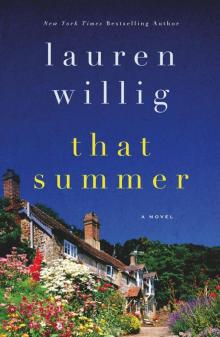 That Summer
That Summer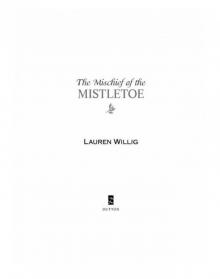 The Mischief of the Mistletoe
The Mischief of the Mistletoe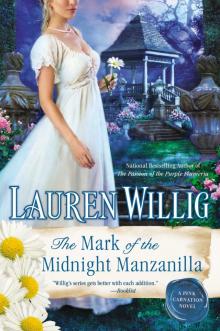 The Mark of the Midnight Manzanilla
The Mark of the Midnight Manzanilla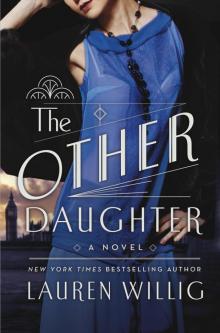 The Other Daughter
The Other Daughter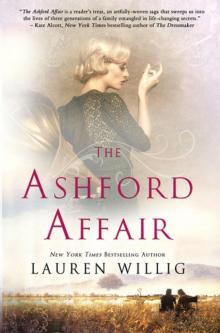 The Ashford Affair
The Ashford Affair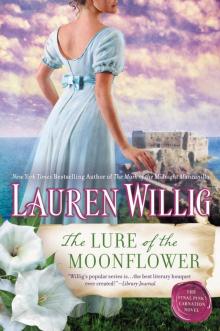 The Lure of the Moonflower
The Lure of the Moonflower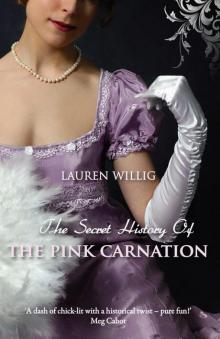 The Secret History of the Pink Carnation
The Secret History of the Pink Carnation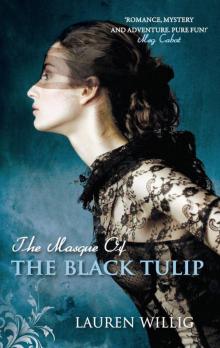 The Masque of the Black Tulip
The Masque of the Black Tulip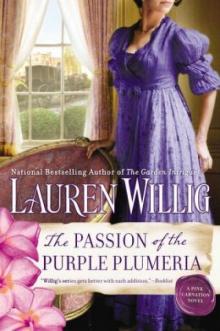 The Passion of the Purple Plumeria
The Passion of the Purple Plumeria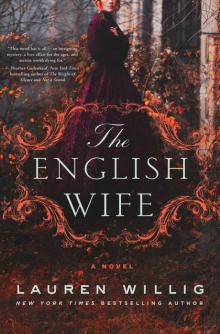 The English Wife
The English Wife The Garden Intrigue
The Garden Intrigue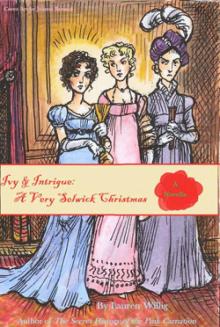 Ivy and Intrigue: A Very Selwick Christmas
Ivy and Intrigue: A Very Selwick Christmas The Orchid Affair
The Orchid Affair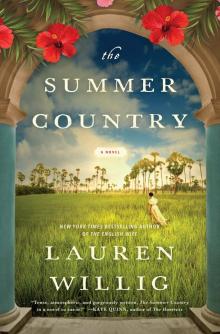 The Summer Country
The Summer Country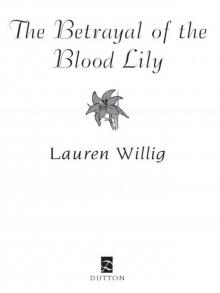 The Betrayal of the Blood Lily
The Betrayal of the Blood Lily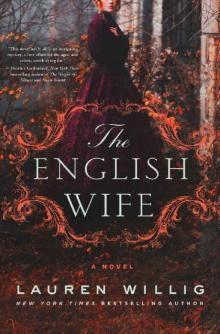 The English Wife: A Novel
The English Wife: A Novel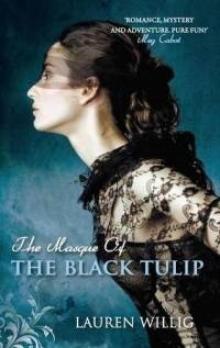 Masque of the Black Tulip pc-2
Masque of the Black Tulip pc-2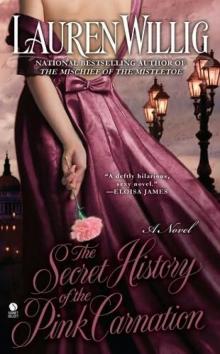 The Secret History of the Pink Carnation pc-1
The Secret History of the Pink Carnation pc-1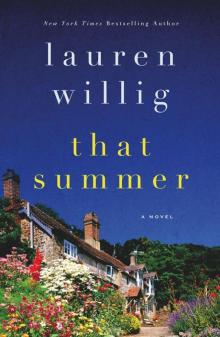 That Summer: A Novel
That Summer: A Novel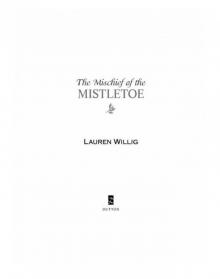 The Mischief of the Mistletoe: A Pink Carnation Christmas
The Mischief of the Mistletoe: A Pink Carnation Christmas